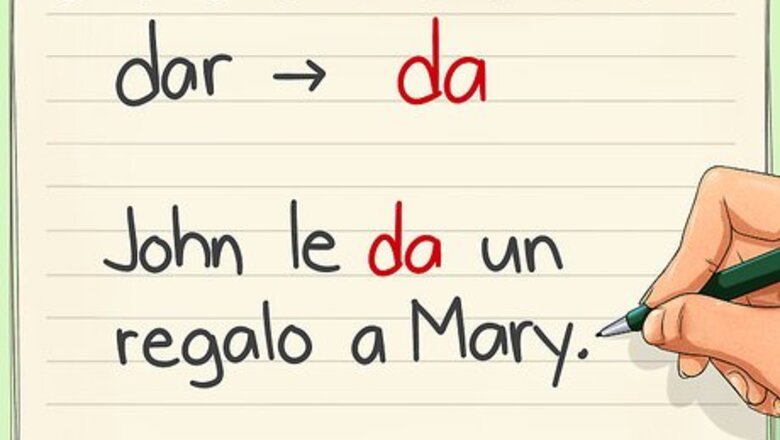
views
Indicative
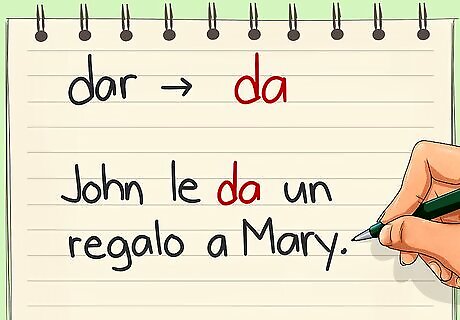
Learn how to conjugate DAR in the present indicative. The main verbal mode in Spanish is the indicative, used in affirmative and negative clauses. When we want to talk about a current action we use the present indicative, the most basic form to express ourselves.As an example we are going to use the same example sentence across the different verb tenses. In this example the verb has no idiomatic meaning, but when use in idioms, the conjugation rules keep the same structure.Example: John gives a present to Mary. John le da un regalo a Mary yo: doy tú: das él/ella/usted: da nosotros/-as: damos vosotros/-as: dais ellos/ellas/ustedes: dan
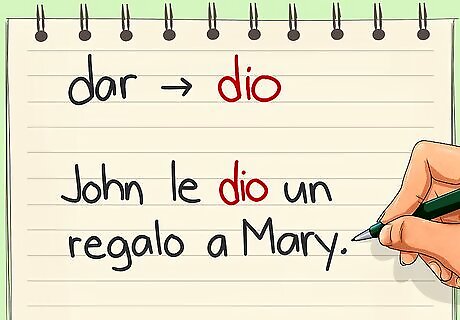
Conjugate DAR in the preterit indicative for talking about past. The preterit indicative form of dar is used to talk about a moment in the past when something was given and the action was completed and followed by a different one.Example: John gave a present to Mary. John le dio un regalo a Mary yo: di tú: diste él/ella/usted: dio nosotros/-as: dimos vosotros/-as: disteis ellos/ellas/ustedes: dieron
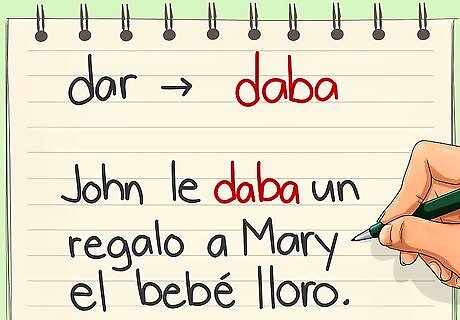
Use the imperfect indicative. Use the imperfect indicative when talking about something definitely or concretely given in the past when the action could have been interrupted by another action in preterit.Example: John was giving a present to Mary when the baby cried. John le daba un regalo a Mary cuando el bebé lloró yo: daba tú: dabas él/ella/usted: daba nosotros/-as: dábamos vosotros/-as: dábais ellos/ellas/ustedes: daban
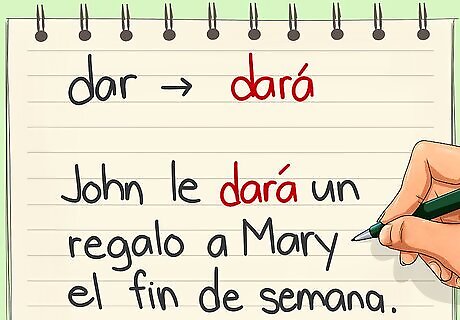
Conjugate the future indicative. Use the future indicative for actions that will happen in the future and they are already confirmed to happen. In this case, you might need this tense for speaking about the action of giving to someone something already planned in a future.Example: John will give a present to Mary on the weekend. John le dará un regalo a Mary el fin de semana yo: daré tú: darás él/ella/usted: dará nosotros/-as: daremos vosotros/-as: daréis ellos/ellas/ustedes: darán
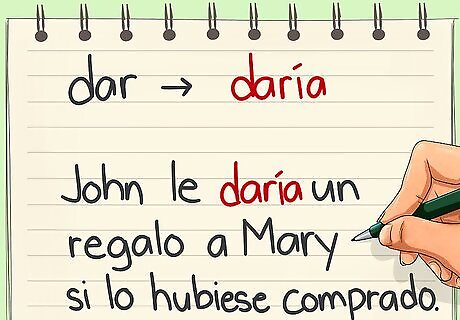
Learn the conditional indicative of DAR. Using the conditional indicative tense will help you when you want to talk about something that will happen in the future if another second action is done. In this case, something will be given or not as a result of the conditioned action. It can be translated as would or could give.Example: John would give a present to Mary if he would have bought it. John le daría un regalo a Mary si lo hubiese comprado. yo: daría tú: darías él/ella/usted: daría nosotros/-as: daríamos vosotros/-as: daríais ellos/ellas/ustedes: darían
Perfect Tenses
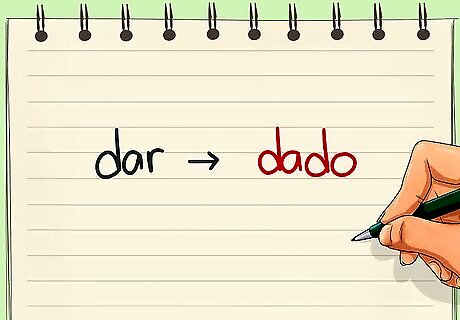
Learn the perfect tenses. Note that the perfect forms of any Spanish verb are formed by combining the conjugation of the auxiliary verb HABER in the appropriate tense, and the past participle of the action verb (i.e. dar). For Dar, the past participle form is dado.
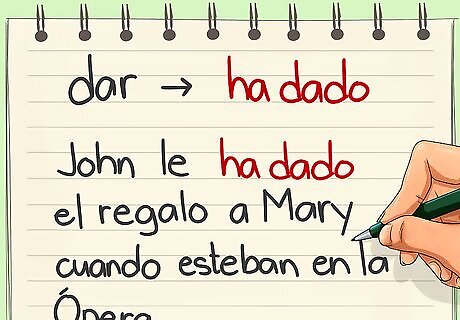
Conjugate the present perfect form of DAR. Use the present perfect form ofdar to discuss the act of giving something before the present time or when you might think that the action happened in the middle of a longer action.Example: John has given the present to Mary when they were in the Opera. John le ha dado el regalo a Mary cuando estaban en la Ópera. yo: he dado tú: has dado él/ella/usted: ha dado nosotros/-as: hemos dado vosotros/-as: habéis dado ellos/ellas/ustedes: han dado
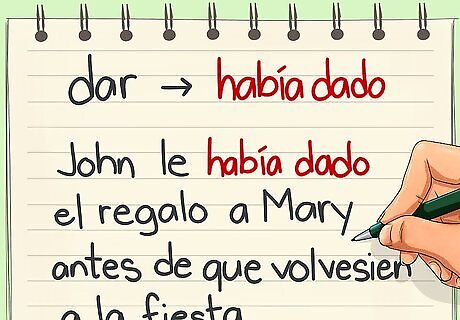
Discover the conjugation of the past perfect tense. Spanish speakers use the past perfect when they need to describe the action that occurred in the past, in relation to another action.Example: John had given the present to Mary, before they came back to the party. John le había dado el regalo a Mary antes de que volviesen a la fiesta. yo: había dado tú: habías dado él/ella/usted: había dado nosotros/-as: habíamos dado vosotros/-as: habíais dado ellos/ellas/ustedes: habían dado
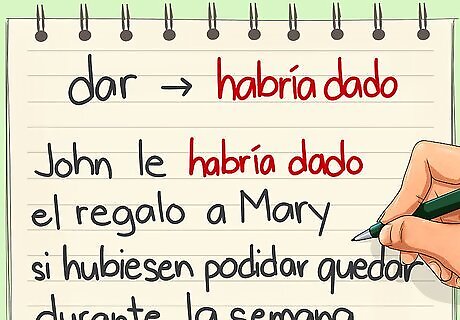
Use of the conditional perfect for DAR. The conditional perfect form should be used when you need to talk or write about an act that would have or could have happened had a certain condition been met. In the conditional both actions occurred in the past and have ended.Example: John would have given the present to Mary if they could have met during the week. John le habría dado el regalo a Mary si hubiesen podido quedar durante la semana. yo: habría dado tú: habrías dado él/ella/usted: habría dado nosotros/-as: habríamos dado vosotros/-as: habríais dado ellos/ellas/ustedes: habrían dado
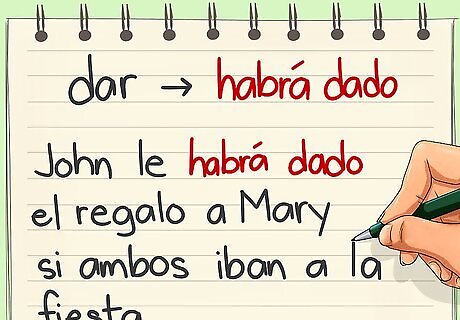
Conjugate DAR in the future perfect. Use the future perfect tense to discuss a situation or thing that will have been given, in relation to another action or condition.Example: John will have given the present to Mary if both went to the party. John le habrá dado el regalo a Mary si ambos iban a la fiesta. yo: habré dado tú: habrás dado él/ella/usted: habrá dado nosotros/-as: habremos dado vosotros/-as: habréis dado ellos/ellas/ustedes: habrán dado
Subjunctive
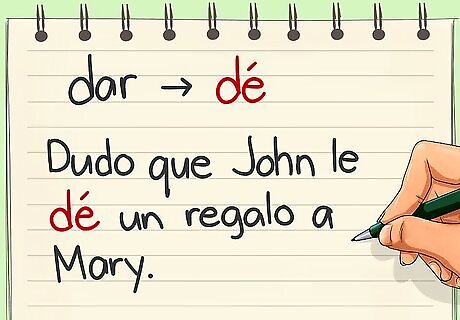
Conjugate the verb in subjunctive. You might need to use the present of subjunctive when you want to express a wish or a doubt about another action. In the case of the verb Dar, we can use it when there is no certainty of something being given or the possibility of this happening. Example sentence: I doubt that John gave a present to Mary. Dudo que John le dé un regalo a Mary yo: dé tú: dés él/ella/usted: dé nosotros/-as: demos vosotros/-as: déis ellos/ellas/ustedes: den
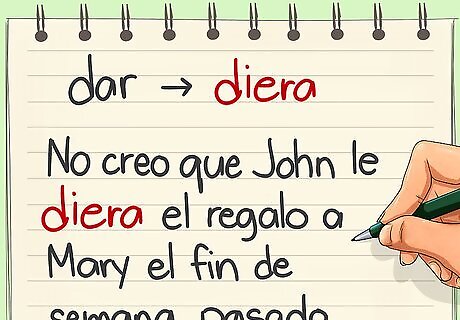
Use the imperfect subjunctive. The imperfect subjunctive should be used when you describe something that you doubt or deny one has given in the past.Example: I don't think that John gave the present to Mary last weekend. No creo que John le diera el regalo a Mary el fin de semana pasado. yo: diera tú: dieras él/ella/usted: diera nosotros/-as: diéramos vosotros/-as: diérais ellos/ellas/ustedes: dieran
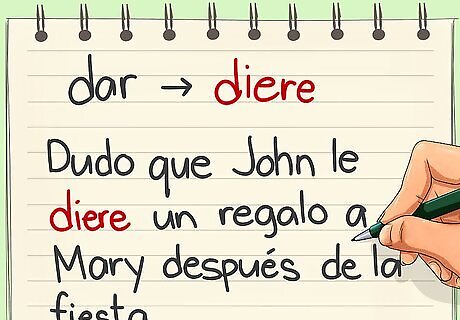
Conjugate the future subjunctive of DAR. Spanish speakers use the future subjunctive to express something that they doubt will happen in the future.Example: I doubt that John will give the present to Mary after the party. Dudo que John le diere el regalo a Mary después de la fiesta yo: diere tú: dieres él/ella/usted: diere nosotros/-as: diéremos vosotros/-as: diéreis ellos/ellas/ustedes: dieren
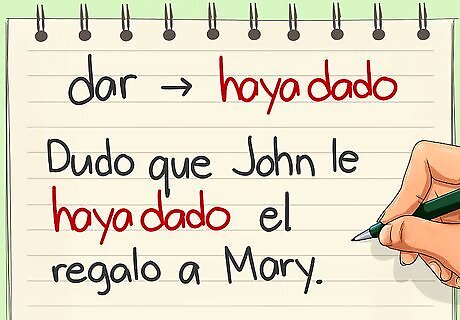
Use the present perfect subjunctive. Use the present perfect subjunctive when you want to express an act that one doubts or denies has happened at any point in time in the past.Example: I doubt that John has given the present to Mary. Dudo que John le haya dado el regalo a Mary. yo: haya dado tú: hayas dado él/ella/usted: haya dado nosotros/-as: hayamos dado vosotros/-as: hayáis dado ellos/ellas/ustedes: hayan dado
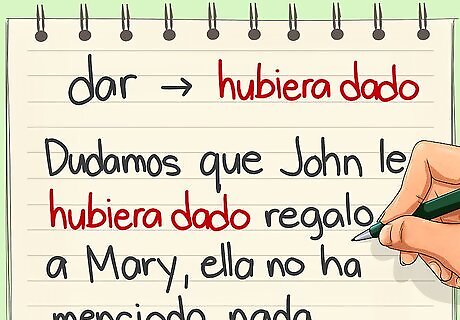
Conjugate the past perfect subjunctive. Speaking with the past perfect subjunctive is useful when talking about an act that one doubts or denies had been done at any fixed point in the past because the speaker does not have any certainty of that action happening.Example: We doubt that John had given the present to Mary, she had not mentioned anything. Dudamos que John le hubiera dado el regalo a Mary, ella no ha mencionado nada. yo: hubiera dado tú: hubieras dado él/ella/usted: hubiera dado nosotros/-as: hubiéramos dado vosotros/-as: hubierais dado ellos/ellas/ustedes: hubieran dado
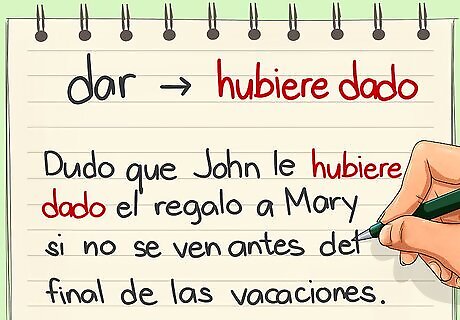
Know how to conjugate DAR in the future perfect subjunctive. The future perfect subjunctive is useful to talk about an act that one doubts will have happened in relation to another event in the future.Example: I doubt that John will have given the present to Mary by the end of the holidays. Dudo que John le hubiere dado el regalo a Mary si no se ven antes del final de las vacaciones. yo: hubiere dado tú: hubieres dado él/ella/usted: hubiere dado nosotros/-as: hubiéremos dado vosotros/-as: hubiereis dado ellos/ellas/ustedes: hubieren dado
Imperative mood
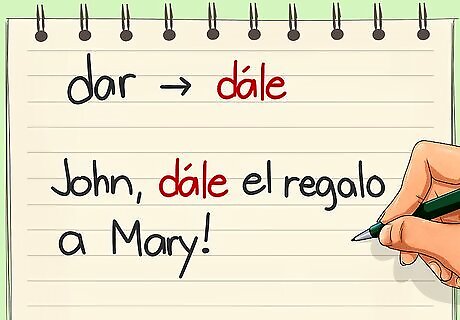
Use the imperative mood for an affirmative tense. Conjugate the affirmative imperative ofdar when commanding someone to give something.Example: John, give the present to Mary! John, dále el regalo a Mary! (Note that in the example the narrator is giving the order to John, so he will be a second person and not a third) tú: dá él/ella/usted: dé nosotros/-as: demos vosotros/-as: dad ellos/ellas/ustedes: den
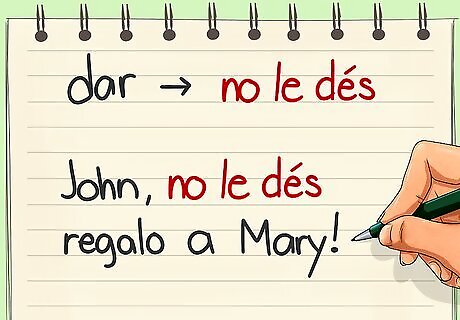
Switch to the negative imperative. Some of the verb endings change when you want to send a negative command. Include the particle ´no´ with all the forms. Note that the verbs use the same ending as the subjunctive when used as a negative command.Example: John, don´t give the present to Mary! John, no le dés el regalo a Mary! (Note that in the example the narrator is giving the order to John, so he will be a second person and not a third) tú: no dés él/ella/usted: no dé nosotros/-as: no demos vosotros/-as: no déis ellos/ellas/ustedes: no den


















Comments
0 comment